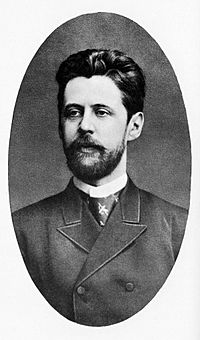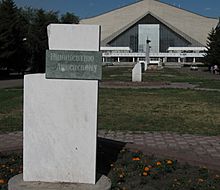Innokenty Annensky facts for kids
Quick facts for kids
Innokenty Annensky
|
|
|---|---|
 |
|
| Born | Innokenty Fyodorovich Annensky 1 September [O.S. 20 August] 1855 Omsk, Russian Empire |
| Died | 13 December [O.S. 30 November] 1909 (aged 54) Saint Petersburg, Russian Empire |
Innokenty Fyodorovich Annensky (Russian: Инноке́нтий Фёдорович А́нненский) was an important Russian poet, critic, and translator. He was born on September 1, 1855, in Omsk, which was part of the Russian Empire. He passed away on December 13, 1909, in Saint Petersburg.
Annensky was part of the first wave of Russian Symbolism. This was a literary movement where writers used symbols to express ideas and emotions. Even though he was a great poet, his work wasn't widely known until after he died. Annensky didn't write for a living. Instead, he worked as a professor and school administrator. He also translated many old Greek writings. He is now seen as one of the most important Russian poets from the early 1900s.
Contents
Biography of Innokenty Annensky
Annensky was born in Omsk in 1855. His father was a public official. When he was five years old, in 1860, his family moved to Saint Petersburg. Annensky lost his parents when he was young. He was then raised by his older brother, Nikolai Annensky. Nikolai was a well-known political activist.
In 1879, Annensky finished his studies at Saint Petersburg State University. He focused on the history of languages. After graduating, he became a teacher. He taught ancient languages and old literature. He taught at a school called a gymnasium in Tsarskoye Selo. From 1886 until his death in 1909, he was the director of this school. A famous poet named Nikolai Gumilev studied there. Gumilev later called Annensky "the last of Tsarskoe Selo's swans."
Annensky was shy about publishing his own poems. He first became known for translating works by Euripides. Euripides was a famous writer from Ancient Greece. Annensky also translated works by French Symbolist writers. From 1890 until he died in 1909, he translated all of Euripides' plays. In the early 1900s, Annensky wrote his own plays. These were like the old Greek tragedies. Some of his plays include Melanippe the Wise (1901) and King Ixion (1902).
Annensky also wrote literary criticism. He published Book of Reflections and Second Book of Reflections. These books contained essays about Russian and European writers. His essays were sometimes called "critical prose." This was because they had artistic value. In his last months, Annensky worked for a journal called Apollon. He published essays about poetry theory there.
Annensky is mostly remembered as a poet. He started writing poems in the 1870s. However, he did not publish them right away. His older brother, Nikolai, advised him not to publish until he was 35. His first book of poems was called Quiet Songs. It was published in 1904. He used the pen name Nik. T.-o, which means "No one" in Russian. He used a fake name because he was a school director. Publishing his new and different poems under his real name might have caused problems. The book received some praise from other Symbolist writers. They didn't even know Annensky was the author.
Annensky's second book, Тhe Cypress Chest (1910), is his most famous poetry collection. Many of his poems were not published during his lifetime. His son, Valentin Krivich, later edited and released them in the 1920s.
On December 13, 1909, Annensky was going to a meeting. He was going to talk about an essay he wrote about Euripides. He had a heart attack at the Tsarskoe Selo railway station. He died there in Saint Petersburg.
Annensky's Poetic Style
Annensky was very interested in Symbolism. He watched how it grew in both Europe and Russia. His knowledge of poetry and Symbolism can be seen in his verses. Some experts say Annensky was the "most pessimistic of the Russian Symbolists." He saw life as a "wicked enchantment." He thought it was an unhappy dream that would end in death.
The idea of death is very important in Symbolist poetry. It is especially strong in Annensky's poems. He felt that life meant nothing without the idea of death. He often wrote about symbols of life and time.
Below are two poems. One is "October Myth" by Annensky. The other is "Tears Fall in My Heart" by the French Symbolist poet Paul Verlaine. "October Myth" shows Annensky's poetic style. It was inspired by Verlaine's poem. This comparison shows how Annensky's poetry was different from French Symbolism.
"October Myth" and "Tears Fall in My Heart"
|
Октябрьский миф |
Il pleure dans mon cœur |
| —Innokenty Annensky, The Cypress Chest, Published by Grif (1910), Moscow, Russia | —Paul Verlaine, Romances sans paroles, in Ariettes oubliées, no. 3, Sens, Typographie de Maurice L'Hermite (1874) |

Legacy
- An asteroid was named after him. It is called 3724 Annenskij. A Soviet astronomer named Lyudmila Zhuravleva discovered it in 1979.
- A memorial stone was placed for Innokenty Annensky in Omsk, Russia. It was put there in 2008.
See also
 In Spanish: Innokienti Ánnienski para niños
In Spanish: Innokienti Ánnienski para niños
 | Claudette Colvin |
 | Myrlie Evers-Williams |
 | Alberta Odell Jones |

